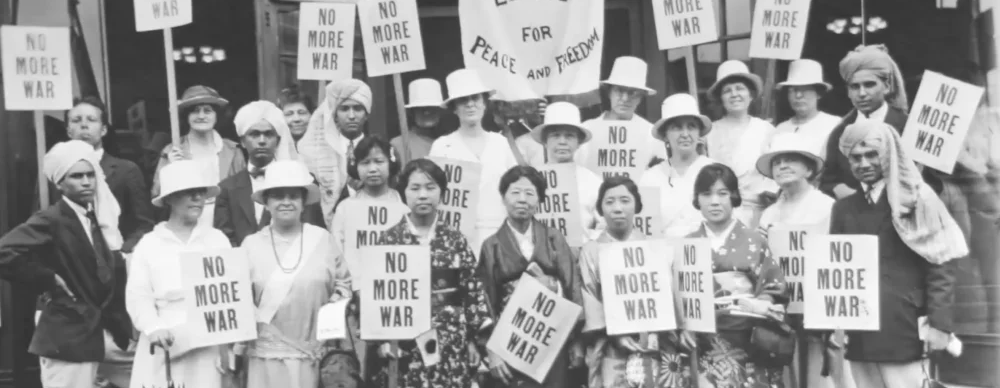-
Tenjo Watanabe
This group photo from the 1960 Tenth Triennial Congress of the War Resisters’ International at the Gandhigram Ashram in South India, was taken by a local Tamil photography studio, Samy Photo, just down the road from the ashram in Chinnalapatti. From the names printed in the framed version, it is clear that the studio aimed…
-
Reading List
We went into this project asking how peace movements – broadly conceived – navigated decolonization. And more specifically, how international peace organizations navigated the inclusion of groups with different understandings of peace and peace work that might not be immediately legible to them? We also want to know where friction occurs in those international interactions.…
-
Peace and Decolonization Research Week
Doing research in archives is a lonely business… or is it? The idea of a collaborative research week is to gather a group of historians around a theme – in our case, peace movements and decolonization, and first get to know each other’s research projects. What are we working on, what are we hoping to…
-
Atomic art cannot rest in peace – thoughts on L’Âge Atomique exhibition
by Floris de Ruiter L’Âge Atomique was an exhibition held from 11 October 2024 until 9 February 2025 at Musée d’Art Moderne (MAM) in Paris. The exhibition makes you relive the nuclear anxiety of the Cold War through its art. Walking through the exhibition was unnerving but also gave me the opportunity to reflect. Although…
-
Peace and Women in Conversation: Deconstructing Myth and Position
by Pratika Dewi Traditional myths divide the world into two camps in almost every aspect of life, such as war and peace. War appears to be men’s business because militarists used the myth of war’s manliness to define and reward soldiers’ behavior. If war is masculine, peace, as the opposite of war, appears feminine because…
-
A Global History of “Good Atoms” and “Bad Atoms”
by Carolien Stolte In L’Âge Atomique (Musée de l’Art Moderne, Paris), the world responds to the sense of instability that was introduced to it from the moment it became known that the atom was not, in fact, its smallest component part. In this perspective, Rutherford’s discovery of subatomic particles functions as the “big bang” from…
-
Anti-nuclear grannies and other unexpected lessons
In November, I was invited to participate in the Global South Colloquium of CAPI: the Center for Asia-Pacific Initiatives of the University of Victoria on Vancouver Island. This year’s theme for the colloquium was “Asia in World History: Indian Ocean Perspectives.” This was the perfect place to think through issues of peace and decolonization in…
-
Unlikely Allies? Asian anticolonial activists and European pacifists in interwar France
In November, I was a guest of the Research Excellence Cluster Global History of Anticolonial Thought at the University of British Columbia (UBC) in Vancouver. This is an interdisciplinary group of scholars and students at UBC who are investigating the multitude of ways that anticolonialism has taken shape across the globe in response to four…
-
Anti-war protests, transnational solidarity and the liberation of Portuguese-speaking Africa, c. 1961-1974
Pedro Aires Oliveira visited the Peace Movements Project on an Erasmus Teaching Mobility, on exchange from the Institute of Contemporary History at NOVA University (Lisbon, Portugal). His expertise on anti-war and solidarity movements during the decolonization of Portuguese-occupied Africa is of great interest to us. As our own research projects deal with peace movements and…
Welcome to the Peace Movements Project blog! Guest posts welcome.
Find a post
Field notes – Follow us as we head into the archives (and their surroundings)!
Talks and Reports – Follow us as we talk about our research around the world! We also welcome guest write-ups of talks and conference related to peace & decolonization.
From the Dataset – Occasionally, our dataset-in-progress draws attention to surprising nodes (or dead ends!) in peace networks, and pulls focus to individuals that initially appear only as names on a list somewhere, but turn out to be much more interesting!
The Art of Peace – Here, we review exhibitions related to peace & decolonization. Also, occasional thoughts on the aesthetic dimensions of peace movements as we encounter them in the archive.
Reading List – We started this project with group reading sessions on peace & decolonization. We keep a partial list here. Suggestions welcome!
RRR
